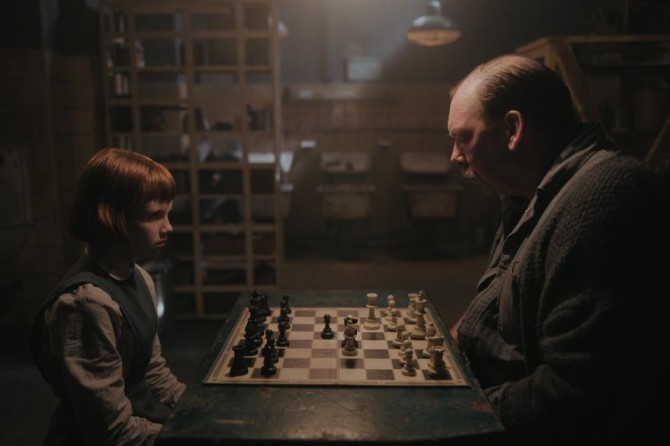A case study in how to create a sympathetic protagonist.
Genre: True Story/Sports
Premise: Set in the 50s, a young orphan girl must rise out of the confines of her orphanage to realize her unparalleled talent in the sport of chess.
About: If we are all looking at the best case scenario for what our proposed screenwriting career looks like, Scott Frank is a great comp. He wrote Get Shorty, Out of Sight, Minority Report, and, most recently, Logan. He’s now teamed up with Allan Scott to adapt the 1984 Walter Tevis novel, The Queen’s Gambit, for Netflix.
Writer (pilot episode): Scott Frank
Details: 60 minutes
Here’s the rule.
If there is a Netflix show or movie that makes it to #1, which then gets dethroned due to some other new Netflix entry, but then makes it BACK to #1? It’s always a great show or movie.
This rule stands until it can be disproven!
That’s exactly what we have today. We have The Queen’s Gambit shooting up to #1 early, getting dethroned by some new Netflix drivel, then charging back to take the top spot again. Check mate, my dear.
Check. Mate.
I didn’t have a lot of interest in this show until I found out Scott Frank was involved (and heard a few of you championing it in the comments section). Frank is a hell of a writer. And now that I’ve seen the pilot, you get a really clear look at what good writing does for a show. Cause everything else at Netflix is so far down the ladder, Queen’s Gambit is looking like Chinatown. If you’re a writer, you’ll definitely want to check it out. Especially if you struggle with writing compelling characters that readers root for.
Beth Harmon is 9 years old when her parents die in a car crash. Beth was in the car too but miraculously survived without a scratch. It’s not clear whether that’s a blessing or a curse. The next thing she knows, she’s thrust into an orphanage that has a pretty good vibe going. Oh, except for the fact that they force their girls to take tranquilizers every day. 1950s America had some radical ideas on how to raise our youth, that’s for sure.
Because Beth is high all the time, she stumbles around the grounds in a spaced out state. But she eventually finds her way to the basement where the janitor, an introspective sad man named Mr. Shaibel, plays chess games against himself. Beth asks him to teach her and while he’s reluctant at first, he soon realizes she has a generational talent for the game.
While Beth struggles to feel emotion after the loss of her parents, it’s clear she enjoys learning the game. Every night before bed, she takes a couple of the tranquilizers she hid, gets high, and envisions a chess board on her ceiling so she can go through all the possible game scenarios. It isn’t long before she’s easily beating Mr. Shaibel. This leads to Shaibel connecting Beth with a chess club friend who works at the high school. That friend asks Beth if she’d like to come play against some new competition. Sure, she says, and promptly beats the school’s ten best players… all at the same time.
Meanwhile, the state suddenly decommissions the use of tranquilizers on children, and Beth is besides herself. She’s come to depend on those pills and now she’s forced to be stone cold sober. Determined to keep her high going, Beth sneaks into the back room where the pills are kept, and jams a large handful of them down her throat. Just as the headmaster reaches the room, Beth OD’s. End of episode.
If there is a super-hack to screenwriting – a singular element that ensures screenplay success – it is a sympathetic protagonist, someone we care about and who we want to see succeed.
If you do that right, it feels to the reader like they know the person. Which means you’ve broken the 4th wall. Of course we want to see them succeed. We feel like we know them!
Unfortunately, the formula for writing that character is elusive. Making your hero funny and giving them a ‘save the cat’ moment will make us care about them, yes. But it’s the degree to which we care about them that matters. If we only “kind of” care, then we’re only “kind of” interested in what happens to them.
And since we’re all so movie savvy, we don’t react well to cliche versions of these constructions. For example, everybody can tell you the reasons why Indiana Jones is [arguably] the most popular movie hero ever. Yet every time someone tries to clone those aspects of his character (charismatic, sarcastic, rebellious, roguish), it doesn’t work.
So how do we create a hero that audiences truly care about? The Queen’s Gambit is a great example of how to pull it off. First, Scott Frank creates a sympathetic situation. Beth loses both of her parents in a car crash. I’m going to come back to that car crash in a minute because I find car crash backstories to be cliche. But Frank does something to make it work which I’ll explain.
In regards to the sympathetic situation of losing your parents, there’s one extra thing you need to do if you want us to really care about that character. Which is this: SHE DOESN’T FEEL SORRY FOR HERSELF. That is so pivotal, I can’t emphasize it enough. Where so many writers get it wrong is they create a character who has experienced trauma or loss… and then they double down and have them feel sorry for themselves. The secret ingredient to creating a sympathetic protagonist through trauma/loss is making sure they don’t lean into that loss and play the victim. We don’t root for those people. I don’t know the science behind it but we just don’t.
And it doesn’t have to be exactly like Beth. Beth isn’t the most joyous person. She’s pretty even keel. But you can have your character be more joyous, depending on the genre and story. The main thing is don’t allow them to be sorry for themselves. We like people who fall down but keep getting up and trying. Not people who fall down and start crying and say they can’t do it anymore.
There’s one more thing you need to do to really kick your character into high gear. It’s not easy to define but I’ll try. You need to introduce one (although more than one is fine) extra element into your character that is offbeat in some way – that takes the character further away from the generic version that everybody else writes. Cause I’ve read a ton of “prodigy” scripts and, trust me, 99% of the time, everybody writes the same prodigy character. You need a mutation if they’re going to feel real.
That comes in The Queen’s Gambit when a fellow orphan asks Beth what the last words her mom said to her were. We then do a brief flashback from within the car, right before it crashes, and the mom says to Beth in a sad defeated tone, “Close your eyes.” Right then we realize the crash wasn’t an accident. It was a full blown murder-suicide attempt.
Before this revelation, it was just another “parents die in a car accident” backstory. But when we see that the mom was actually trying to kill them all, then it becomes a lot more sinister, and creates feelings from the daughter that are way more complicated. A single feeling (sadness) is often boring. But two conflicting feelings (sadness and anger) can ignite a character, since it places them in a constant state of conflict. This was the thing that elevated the character, in my eyes. She truly felt different after that.
In addition to that, Frank does what I tell you guys to do all the time – make unconventional choices throughout your story. Turning your 9 year old heroine into a full-blown drug addict was very much an unexpected choice. And even the orphanage itself – which was a safe and loving place, for the most part – was an unconventional choice, seeing as 9 out of 10 writers would’ve turned the headmistress into Miss Hannigan.
My only issue with the show so far is that it isn’t clear if the drugs help her play chess better or she’s just hooked on them and needs them to feel good. I’ll be disappointed if she needs them in order to play well.
But regardless, I thought this was strong! Nice to see a good show on Netflix again!
[ ] What the hell did I just watch?
[ ] wasn’t for me
[xx] worth the stream
[ ] impressive
[ ] genius
What I learned: Is there better actor catnip than the tortured genius? There isn’t an actor in the world who doesn’t want to play that role. So if you’ve got an idea with a tortured genius in it? Go ahead and write it. You’ll have WME, CAA, and UTA kicking down your door to get their client attached.



